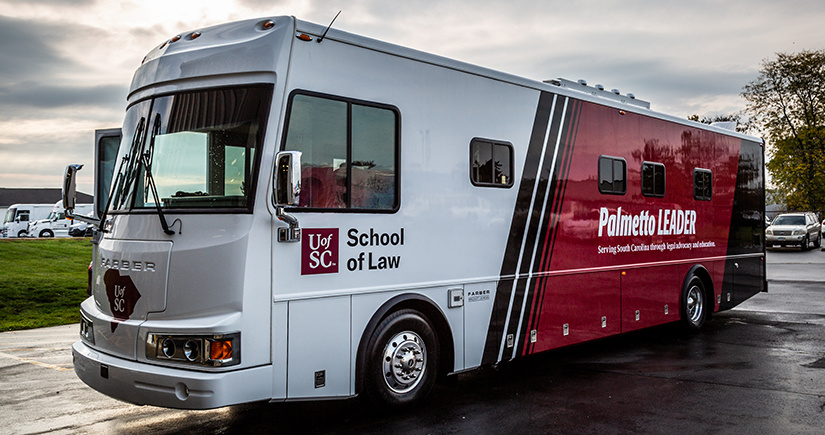Public service and access to justice have long been hallmarks of the University of South Carolina School of Law’s mission, but the ability to provide those services was mostly limited to the Columbia area. Beginning this year, the School of Law will strengthen its impact statewide thanks to the Palmetto LEADER, a custom-built bus that will function as a mobile law office.
The Palmetto LEADER (an acronym for legal advocacy and education resource) features two private offices, a waiting area and the technology required for on-site delivery of legal services such as drafting wills, reviewing legal documents and providing legal counsel to those who are unable to afford traditional means for legal services.
Funding for the Palmetto LEADER was made possible thanks to a donation from the Konduros Fisherman fund through the late James Konduros, a 1954 School of Law alumnus.
While the bus is tentatively scheduled to roll out twice a month, planning for each trip starts weeks in advance to ensure smooth operation and to maximize the number of clients that can be helped during each visit.
“To be as efficient and effective as possible, our volunteer lawyers and students — as well as our clients — need to know what kind of services we are providing, so they are prepared with the necessary documents,” says Pam Robinson, director of the Pro Bono Program, and the primary driver of the effort. “There would be nothing worse than traveling out to a location, just to turn people away because they don’t have the right forms for us to be able to help them.
“That requires us to work with our community partners to not only identify the need, but to allow them time to alert their clients and for the clients to find their papers and sign up.”
One of the first stops for the Palmetto LEADER will be the Free Medical Clinic of Darlington County, where the team will provide residents with health care power of attorney documents. Robinson had originally hoped to make the trip last summer, but COVID-19 put everything on hold. While the delay has been less than desirable, Robinson says a silver lining has emerged.
“COVID has made me rethink so many aspects of this project,” she says. “But one of the biggest impacts has been the ability to step back, really focus on who our clients will be, and see how we can do an even better job of serving them.”
Part of this realization came early last year when the campus closure forced Robinson and her Volunteer Income Tax Assistance students to partner with and move the program to Cooperative Ministries, a nonprofit that provides crisis assistance to people experiencing poverty.
“That opened us up to a different audience, some of whom were coming from homeless shelters, and it was evident that many of them needed help with more than just their taxes,” Robinson says. “But it’s not like they were going to a regular law office where they could come back anytime and find us. So, we produced brochures and flyers on different topics that provided information they could take with them.”
That’s when it hit her. Whether at Cooperative Ministries in Columbia or in the Palmetto LEADER halfway across the state, Robinson and her students would be facing similar clients in similar situations. They would need to be prepared to address multiple problems in just a few hours.
“We’ll be going to very rural parts of the state, places where there are very few legal resources close by, or where folks can’t afford to pay,” Robinson says. “We might be going there to draft a simple will and find out they are having problems with benefits claims or a landlord-tenant issue. If we can help them, or at least provide some guidance, that’s what we want to do. We need to have those resources ready.”
She also wants to make sure that every person leaves with a checklist of their most important legal documents, such as their birth certificate and most recent tax return, as well as a Ziplock bag to store them in.
“It’s not much, but we’re working with clients who can’t afford safety deposit boxes,” she says. “Just having one place to keep all these items will give them some comfort.”
Similar to the VITA tax preparation program, Robinson says she’s had to account for new operating procedures and reconsider how to use the space on the bus to observe physical distancing protocols. The inside of the bus has three rooms separated by soft walls, all surfaces include an anti-microbial coating, and plexiglass dividers will be fitted to help protect students and clients.
Robinson says that while safety is a major concern, just as important is ensuring everyone involved — client, lawyer and law student — has a positive experience. What she’s most excited about is the experience law students will receive and the connections they will make on these trips.
“All I can think of is the ride back while we debrief the students,” she says. “The chance to dig deeper and help them process what happened, what they learned, what went well, and what they could do better next time. That is what will help them be better lawyers down the road. And that’s ultimately why we’re here.”
